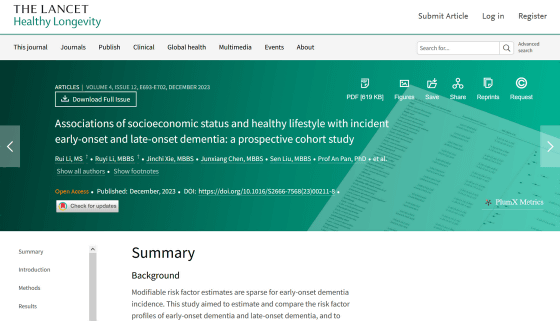People with low income and education are three times more likely to develop early-onset dementia.

Dementia is a disorder in which memory and cognitive abilities deteriorate, which interferes with daily life, and cases where dementia symptoms appear even when the person is under 65 years old are called
Associations of socioeconomic status and healthy lifestyle with incident early-onset and late-onset dementia: a prospective cohort study - The Lancet Healthy Longevity
https://www.thelancet.com/journals/lanhl/article/PIIS2666-7568(23)00211-8/fulltext

Lower socioeconomic status 'triples risk of early-onset dementia' | Alzheimer's | The Guardian
https://www.theguardian.com/society/2023/nov/29/lower-socioeconomic-status-triples-risk-of-early-onset-dementia
It is known that people with low socio-economic status in terms of employment and income are not only unable to afford daily living, but also have a negative impact on their health and mental state. A research team from Huazhong University of Science and Technology in China analyzed data from UK Biobank , a large biobank in the United Kingdom, thinking that socio-economic status might be associated with the risk of early-onset dementia. .
It is estimated that approximately 3.9 million people worldwide suffer from early-onset dementia, which occurs before the age of 65, and 370,000 people are newly diagnosed with early-onset dementia every year. However, most studies have focused on late-onset dementia that occurs in older people, and the risk profile of young-onset dementia has not been adequately evaluated.
The research team looked at approximately 440,000 people from around 500,000 people who participated in UK Biobank between 2007 and 2010, excluding those for whom there was no data on socio-economic status or those who were diagnosed with dementia at the start of the study. I looked into the data. In addition to tracking whether subjects developed dementia, the study also measured socio-economic status based on items such as household income, employment type, and educational background. A survey was also conducted on lifestyle factors such as smoking status, alcohol intake, physical activity, and dietary habits.

The analysis found that lower socio-economic status, unhealthy lifestyles, being male, experiencing social isolation, and having a medical condition were associated with higher rates of early-onset and late-onset dementia. It turns out that it is related to. In particular, it was found that people with lower socio-economic status were three times more likely to develop early-onset dementia than those with higher socio-economic status.
Less than 12% of people with low socio-economic status who developed early-onset dementia were found to be affected by lifestyle habits, and even if people with low socio-economic status had a healthy lifestyle, This did not necessarily offset the risk of developing early-onset dementia.
Also, people with low socio-economic status and unhealthy lifestyles have a higher risk of developing early-onset dementia compared to people with higher socio-economic status and healthy lifestyles. It has been shown to be as high as 440%.

The current study showed that the association between low socio-economic status and the risk of developing dementia was greater in early-onset dementia than in late-onset dementia. The research team concluded, ``Therefore, relying solely on promoting healthy lifestyles without considering other social determinants of health may result in lower socio-economic disadvantages in early-onset and late-onset dementia.'' It may not be possible to substantively reduce equality.'
Tommaso Filippini , a public health researcher who was not involved in the study, acknowledged the importance of promoting a healthy lifestyle, but said: ``The results of this study demonstrate that reducing the incidence of dementia is This suggests that there is a strong need for efforts to reduce social disparities.'
Related Posts:
in Science, Posted by log1h_ik







